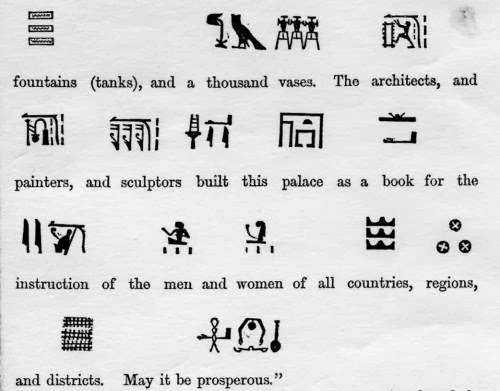To clarify: An Interpreter listens to someone speaking one language and then speaks in another, such as, one person speaks German, another listens and interprets to English.
A Translator is one who translates one language into another in writing, on paper.
Where are translators and interpreters used?
- In the military, where we have troops stationed in a non-English speaking country-- to communicate with people so they understand what our troops are trying to do
- Military-to translate for purposes of national security
- You might work for the government in roles at national embassies or at the United Nations
- You may interpret for visiting world leaders or businessmen in Washington D.C.
- Reporting the news: interviewing people who do not speak English, whether here or in other countries
- Businesses may need interpreters and translators when they do business with other countries
- Matters concerning the law in one country vs. another may require interpretation
- Medical---doctors may want to confer with others in another country, or patients may need an interpreter to explain what a doctor is telling them. Be aware that frequently, this type of interpretation requires an advanced degree due to the need to understand many medical conditions.
- Financial--translating may be used for investors in other countries
- Social services need interpreters to assist new immigrants
- Police may need interpreters to investigate crimes
- Interpreters for the deaf are always in demand
*Did you know: there are many versions of sign language for the deaf in other countries. Ironically, even though the 'language' is still English, British Sign Language is not the same as American Sign Language. Here is the alphabet in BSL:
For more signs in BSL, go to: http://www.british-sign.co.uk/british-sign-language/dictionary/
- Translators can also work with historical documents and objects. An example would be Egyptian hieroglyphics, which would involve education not only in ancient languages but in the cultures of ancient times.
- You may find a niche as an interpreter or translator of obscure and rarely-spoken languages.
- You may find a dialect or a language that people want to keep alive, such as Native American languages.
What kind of person would work well as a translator or interpreter? Someone who has....
- Knowledge about, respect for, and interest in other cultures
- Interest in travel to other countries
- Great intuition when interpreting/translating
- An ability to recognize and 'weed out' accents in peoples' speech
- An approachable and friendly manner
- A sense of calm in possibly tense situations
- Keen listening skills
- An ability to translate 'purely,' not to embellish with your own opinion
- A quality of tactfulness
- Respect for confidentiality when necessary
- Qualities such as maturity, reliability, and integrity
- Flexibility
What education would be required to be a translator or interpreter?
You will likely need a bachelors or masters degree in another language, such as Spanish, French, Chinese; a minor in the history of that country would also be helpful. Of course, it would be an advantage if you are bilingual, that is, you have spoken two languages your whole life, but you would still benefit from obtaining a degree. If you can interpret or translate several languages, you will be in higher demand.
A Masters in Translation is offered at some colleges, and study abroad that immerses you in a language and culture will be a great opportunity to improve your translating/interpreting skills.
Most major universities offer degrees in languages and studies of the cultures of other countries, but here are some to check out:
North Dakota State University: : http://www.ndsu.nodak.edu/ndsu/academic/factsheets/ahss/modlang.shtml
University of Arizona: https://silc.asu.edu/
College of Arts & Sciences, American University: http://www.american.edu/cas/wlc/index.cfm
You will want to obtain a certification from the American Translators Association:
http://www.atanet.org/certification/aboutcont_overview.php
While you are learning the language(s), you will also learn about the culture of the people who speak the language. Another thing to remember is the range of vocabulary even within one country. In Germany, for example, there are several different dialects spoken depending on where in Germany you live. In France, there are formal versions and less formal versions of the language, depending on how familiar with someone you are.
Look at the different languages spoken around the world: black areas indicate local dialects, red are people who speak English. This map doesn't indicate the number of people speaking a given language, just where the languages are spoken.
The greatest number of people in the world speak:
1. Mandarin (Chinese dialect)
2. Spanish
3. English
4. Hindi, spoken in India and Nepal
5. Arabic
6. Portugese
7. Bengali, also spoken in India
8. Russian
9. Japanese
10. Punjab, spoken in India
Many interpreters work free-lance. This means they are self-employed, and people approach them to ask for interpreting or translating. They may work for an agency of translators which will field requests and contact you to ask if you want an assignment. In either case, this career is 'portable,' since you don't need to have an office to do the work. You can be a translator or interpreter virtually anywhere, and with the Internet, you can turn in your written assignments no matter where you are.
Of course, being self-employed also means you need to stay motivated to pursue clients. This means networking, attending conferences, being known in your community, and taking as many jobs as you can, at least to start. You will become known by word of mouth, so you want to be 'out there' as often as possible.
Do you want to work with others and be helpful in your community, or travel to interesting places and work with a variety of people? Consider a job interpreting or translating.








No comments:
Post a Comment
Note: Only a member of this blog may post a comment.